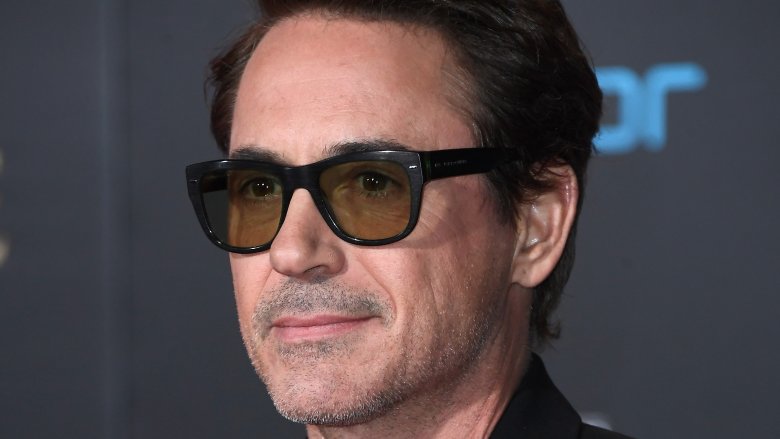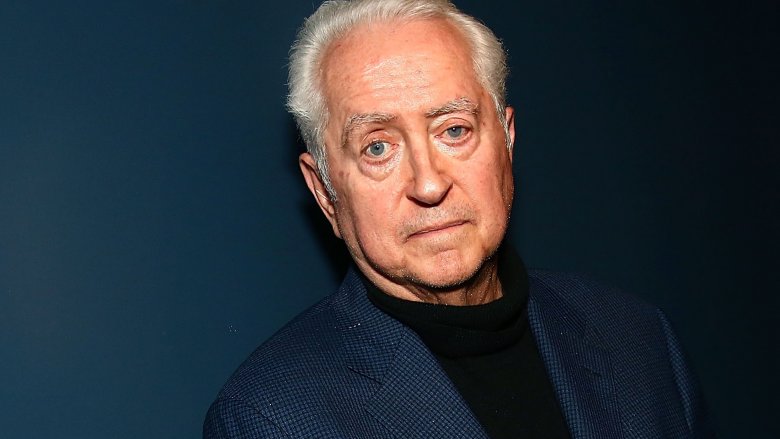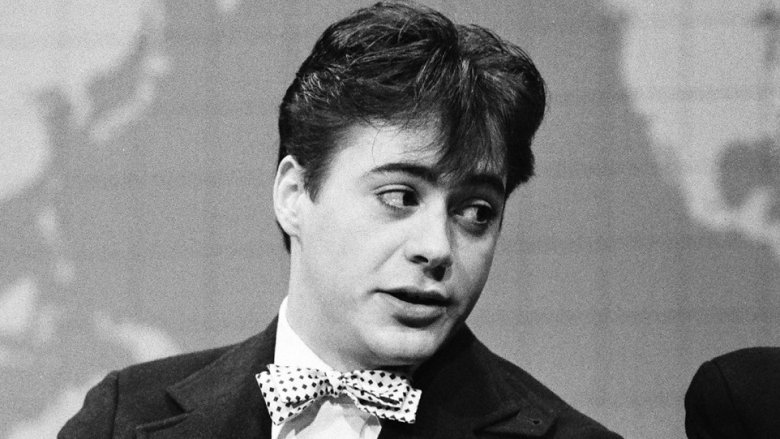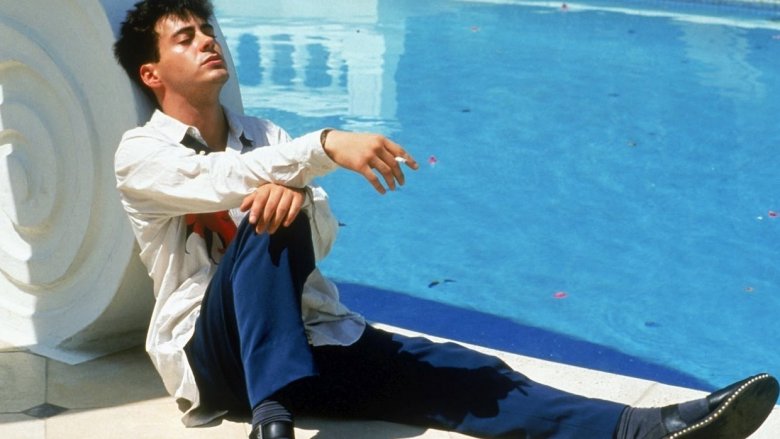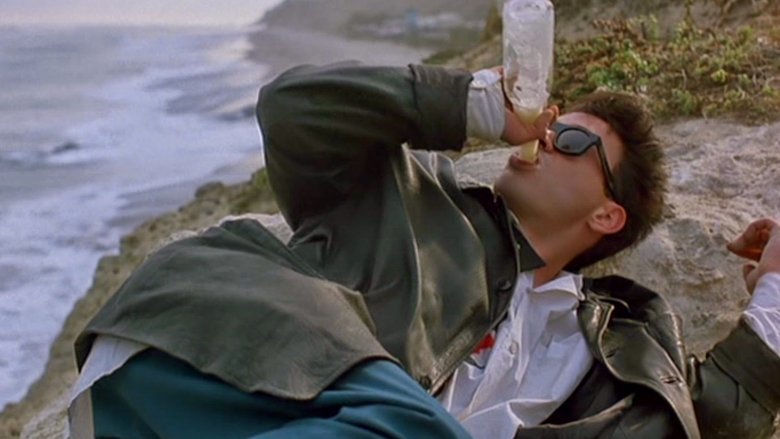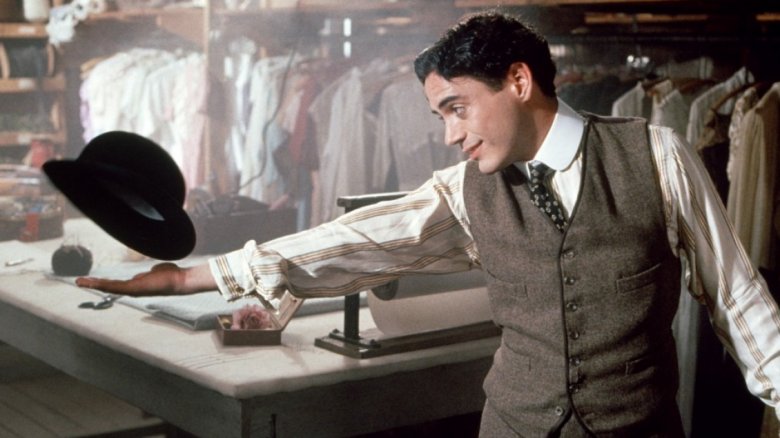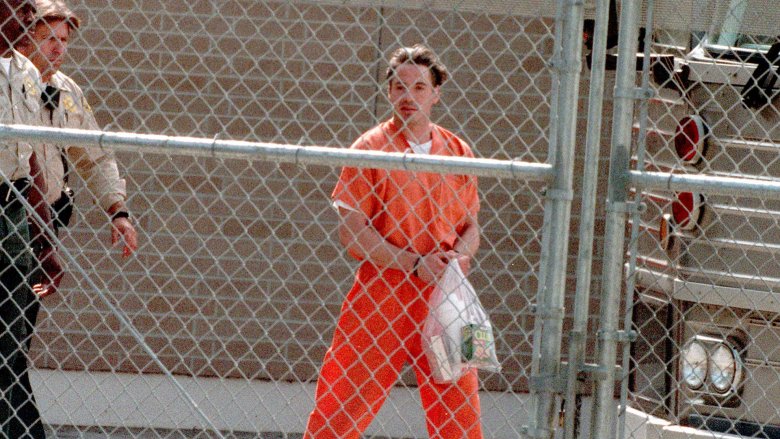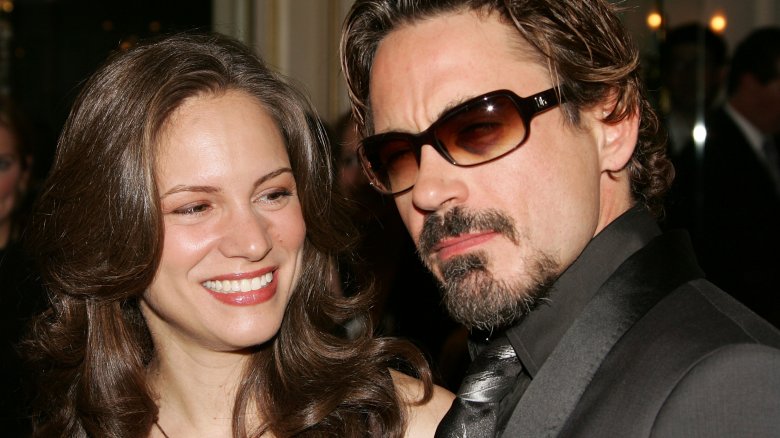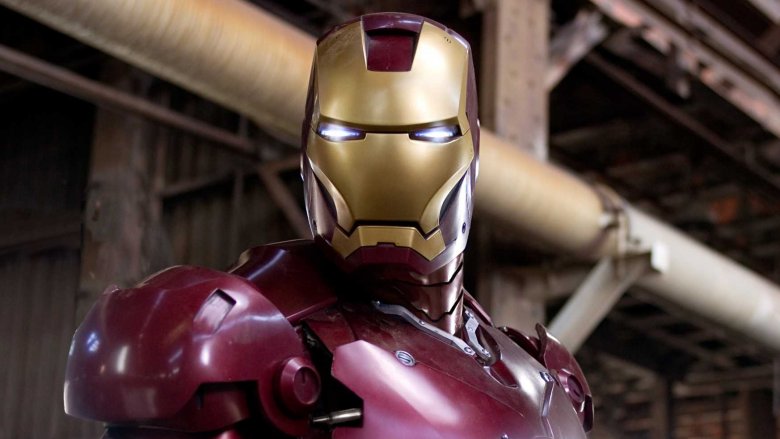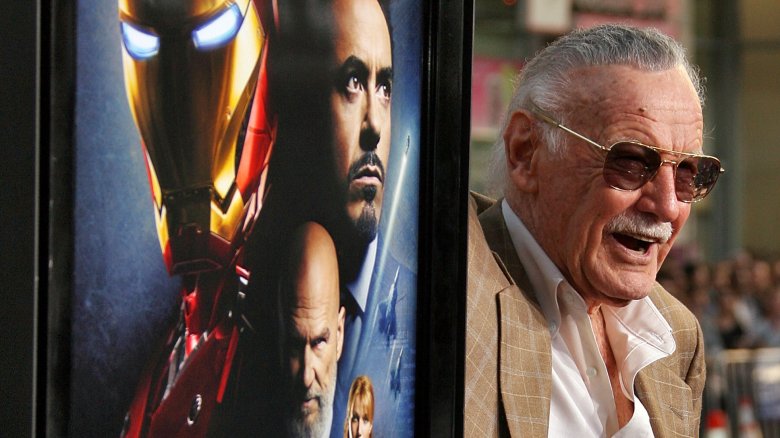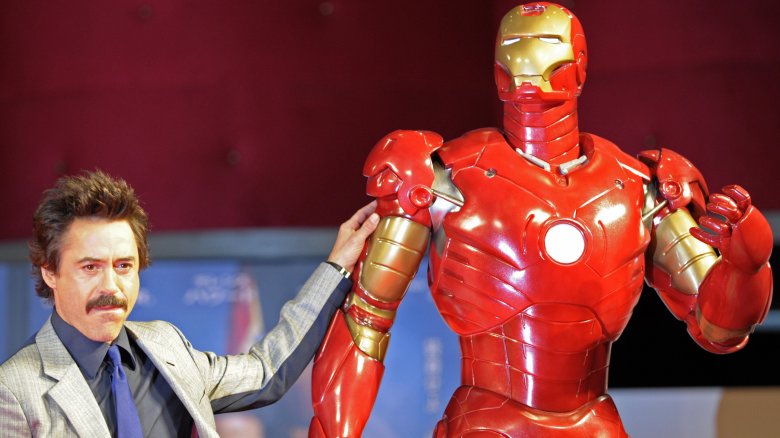How Robert Downey Jr. Went From High School Dropout To Iron Man
Robert Downey, Jr. has been a fixture in Hollywood longer than many of his fans have been alive. While his talent and charisma have always been undeniable, he was long plagued by offscreen troubles that threatened to sink his career—but over the last decade, he's experienced personal and professional resurgence that has him on top of the world and Hollywood's A-List (not to mention the Marvel Cinematic Universe). It's not easy to go from high school dropout to founding member of the Avengers, but showbiz—and struggle—have been in Downey's blood from a young age.
His father was an underground filmmaker
Downey's irreverence, self-deprecating humor and anti-authoritarian streak make a lot of sense if you happen to be familiar with the works of his father. Robert Downey, Sr. started writing and directing independent films in the early 1960s with titles like Sweet Smell of Sex (in which a female visitor to New York must fend off the entire pervert population of the city) and Chafed Elbows (in which a guy on welfare marries his mother.) None of his films even received a wide release until the 1969 satire Putney Swope, the story of a black man accidentally put in charge of an advertising agency, which became a minor classic and an influence on such widely varying talents as Paul Thomas Anderson and Louis C.K.
Young Robert was only four when the film was released, and would make his film debut a year later—in his dad's movie Pound, in which all the actors play dogs. A year after that, Downey, Sr. let his son try marijuana for the first time, which he later came to greatly regret. Junior was already well on his way to living an actor's life at a very tender age, and when his parents divorced in 1978, the 13-year old followed his dad from their previous home in New York to L.A.
In the early '80s he attended Santa Monica High, where future superstars Sean Penn, Rob Lowe and Emilio Estevez were all his classmates, but he only lasted two years. In 1982 at the age of 16, he dropped out to pursue a full-time acting career.
He got started in New York
Rather than attempt to break into Hollywood, the teenage Downey decided to return to his mother's in New York. It didn't take him long to land roles in a couple of small productions there—including Firstborn, a little-remembered drama in which his co-star was an 18-year old Sarah Jessica Parker. The struggling actors hit it off immediately, beginning a relationship that would last for years even as Downey became a mainstay on the New York party scene. But it wasn't excessive partying that almost prematurely derailed him professionally—it was an odd and poorly thought-out career move.
In 1985, 20-year old Downey joined the cast for the 11th season of Saturday Night Live. Producer Lorne Michaels had just returned to the show after five years, and in his absence, its quality and ratings had gone steadily downhill. His all-new cast included the likes of Dennis Miller, Jon Lovitz, and Anthony Michael Hall—and in surviving clips from the season, it's painfully apparent that Downey was out of his element. Talented as they were, the rest of the cast failed to click with each other, and Downey was among many who were canned at the end of the season.
The '80s were pretty good to him professionally
The sacking from SNL was a blessing in disguise, as it coincided almost exactly with the rise of Downey's film career. During the season, he'd squeezed in small roles in the John Hughes films Weird Science and Pretty in Pink as well as the Rodney Dangerfield comedy Back to School, beginning a run from 1985 to 1989 in which he appeared in no fewer than two films per year. 1987 brought two highlights: his first lead role (in The Pick-Up Artist, opposite Molly RIngwald) and his most critically acclaimed role to date—albeit one that would have a lasting impact on his life.
Less Than Zero, an adaptation of the bleak Bret Easton Ellis novel, featured Downey in a supporting role as the hard-partying cocaine addict Julian Wells—a widely praised performance that stunned critics with its emotional depth. The resulting recognition as a serious actor would help his hot streak to continue through the rest of the '80s, but the experience of making Less Than Zero had some very unfortunate repercussions.
But they weren't so great personally
Drugs had virtually always been a part of Downey's life, but he's pointed to Less Than Zero as the time when the troubles really began. He explained to The Guardian: "Until that movie, I took my drugs after work and on the weekends. Maybe I'd turn up hungover on the set, but no more so than the stuntman. That changed on Less Than Zero. I was playing this junkie... The character was an exaggeration of myself. Then things changed and, in some ways, I became an exaggeration of the character. That lasted far longer than it needed to last."
His first stint in rehab in 1987 did little to curb his drug habit—yet said drug habit did little to curb his exploding career. He continued to struggle with drugs while building his impressive '80s resume, and by the early '90s his career was peaking as his personal life was falling apart. In 1991, he starred in the critically acclaimed Soapdish alongside Sally Field and Kevin Kline; also that year, Sarah Jessica Parker ended their seven-year relationship due to Downey's drug addiction.
Chaplin took him to the A list
Despite his personal troubles, the career highlights just kept coming. Less Than Zero and Soapdish established his reputation as a critically acclaimed actor, and the 1992 biopic Chaplin thoroughly cemented it. While the film itself received a mixed reception from critics, the praise heaped upon Downey's performance as Charlie Chaplin was nearly universal. The role made him one of the most in-demand actors in Hollywood, and earned him a Best Actor Academy Award nomination.
He followed it up with acclaimed turns in Robert Altman's ensemble masterpiece Short Cuts in 1993 and Oliver Stone's Natural Born Killers in 1994, and was well on his way to becoming one of the most respected actors in Hollywood. Downey's personal life also seemed from the outside to be looking up during this time, as he married actress Deborah Falconer, who gave birth to their son Indio in 1994. But his troubles with addiction would soon boil over, often in very public and bizarre fashion.
Drug addiction nearly ended it all
In June 1996, Downey was arrested for felony cocaine and heroin possession after being pulled over for driving his Porsche while completely naked in Malibu. A few weeks later, literally hours after being charged with that crime, Downey was discovered by an extremely confused homeowner in his neighborhood, who found the famous actor cozily tucked into bed in one of his guest rooms. He was again arrested and charged with trespassing and being under the influence of heroin, and over the better part of the next decade, Downey's name would become sadly synonymous with "talented actor consumed by drugs."
Numerous trips to rehab seemed to be doing nothing to quell his habit, and the film roles diminished in size and frequency as the arrests piled up. At a hearing in 1999, Downey told a judge: "It's like I have a loaded gun in my mouth, and my finger's on the trigger, and I like the taste of gun metal." He was subsequently sentenced to 12 months in prison, and released in August 2000.
A brief comeback on the hit TV series Ally McBeal was derailed by more drug charges in 2001, which led to another stay in rehab and three years' probation. He would tell Oprah Winfrey in 2004 that this arrest was the point at which he decided something needed to change, saying: "I said, 'You know what? I don't think I can continue doing this.' And I reached out for help, and I ran with it... It's not that difficult to overcome these seemingly ghastly problems...what's hard is to decide to do it." By then, it was already too late for his marriage—Falconer had divorced him in April of that year.
He cleaned up his act and remarried
Fortunately for Downey, a new relationship started as his marriage was ending—and it turned out to be the one that cemented his decision to turn his life around. He met producer Susan Levin in 2003 on the set of the film Gothika, and the relationship turned serious pretty quickly—but Levin let it be known that she wouldn't marry Downey unless he gave up drugs completely. This was the final nail in the coffin for his old life, and the two were married in 2005.
He became an ardent student of Eastern philosophy, practicing meditation and Kung Fu, and with his newfound focus and sobriety came an uptick in the number of interesting roles being offered. Well-received turns in Shane Black's Kiss Kiss Bang Bang, the historical drama Good Night and Good Luck and the Philip K. Dick adaptation A Scanner Darkly culminated in a supporting role in the 2007 David Fincher thriller Zodiac, one of the most critically acclaimed films of that year. His life and career were back on track, but destiny was waiting in the form of an upstart film studio and a wildly ambitious project that would soon change the film industry forever.
Landing the role of a lifetime
It's hard to imagine a time when Marvel Studios didn't dominate the box office, but when the studio secured funding for its slate of independently produced films through Merrill Lynch in 2005, it seemed like a giant $525 million gamble. Marvel had famously sold off the film rights to many of its most popular characters, and it was putting up the rights to all of the characters they intended to use to launch their films—basically their entire B- and C-list—as collateral. All except one: Iron Man, whose rights weren't included in the deal. Marvel knew they wanted to lead with Ol' Shell-Head, so their first film was produced out of their own relatively shallow pocket.
Seemingly everybody was considered for the role, including—perhaps most famously—Tom Cruise, who actively lobbied for it. Downey himself admitted that he "wasn't at the top of anybody's list" to play Tony Stark, but when his casting was announced in 2006, fans were extremely receptive. It was widely noted that Stark as portrayed in the comics had struggled with addiction himself, and most fans felt Downey had the charisma to do the character justice onscreen. In announcing his casting, Marvel Studios chief Kevin Feige hit the nail on the head while explaining the choice: "We looked at everybody, and we found the best person for the role. It's as confident a casting move as we've ever done. The proof will be in the pudding, but he is Tony Stark."
Iron Man was an unexpected smash
2008's Iron Man has been called, in retrospect, the riskiest film in history. By the time of its release, Marvel had announced that all of its films would take place in the same shared universe, with characters crossing over between films—at the time, simply an intriguing concept which was just as likely to be bungled in execution as it was to actually work. Iron Man would set the tone for this universe, setting up Marvel's entire slate of films and essentially selling the whole concept of the MCU to filmgoers—a concept upon which the last of Marvel's fortunes rested. Much of this depended upon its leading man, and if the film had flopped, Downey's career might have recovered, but Marvel likely never would have.
But of course, the film was an unexpected smash hit with critics and audiences alike, and among all of the praise, Downey was singled out for inhabiting his character in a way that few superhero movie leads have done before or since. The film's now famous post-credits stinger had audiences buzzing about a possible Avengers crossover, and Downey's cameo in The Incredible Hulk later that year confirmed for audiences that, yes, it was really all the same universe. Marvel's gamble had officially paid off; Iron Man grossed nearly $600 million worldwide, and Downey's Tony Stark was suddenly a household name.
The MCU cemented his legacy
The Marvel Cinematic Universe has gone on to become the highest-grossing film franchise of all time, and Robert Downey, Jr. has been its face from the very beginning. In the eyes of millions of film fans, Downey is Tony Stark, and always will be. Despite snagging another Oscar nomination in 2008 for his amazing comedic turn in Tropic Thunder and helping to create a popular new spin on Sherlock Holmes, it's become increasingly difficult to tell where Downey ends and Stark begins.
Even Downey himself admits having a little trouble with this, telling a fan during a Reddit AMA: "The first Iron Man was essentially wrapping the character around a cooler version of 'me.' As we've gone along, I'm starting to wonder who's playing who, and I'm glad there are so many talented new people in the Marvel lineup. Ultimately, I'm real, and he's not. It's kind of important for me to remember that."
He can take comfort in the fact that it's not any easier for the rest of us. He's been a high school dropout, a struggling addict, an A-List actor, and an inmate—but if you're going to be remembered for one thing, being an iconic superhero seems like a pretty good one.
